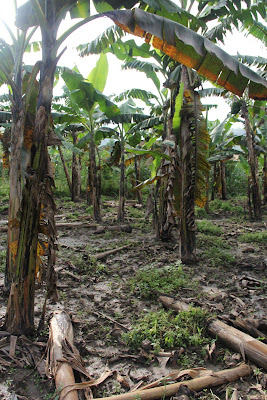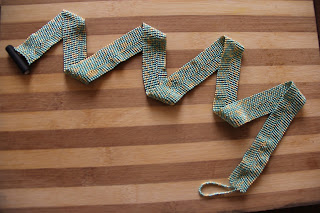Naming a blog can be hard work, especially when the subject is my life. Looking to my growing vocabulary for inspiration (thank you GRE?) I found panoply, which means "a complete or impressive collection of things." While I can't guarantee that what I write will impress, it is definitely a collection of "things" having to do with my life, travels, interests, and photos that I want to share. And everything sounds better in Spanish. So there you have it. panopliamia.
Saturday, December 31, 2011
Moshi, Tanzania (Dec.13-15)
Friday, December 30, 2011
Local Food 2: The Slaughter



Wednesday, December 7, 2011
Flatbreads and Bulgur




Sunday, December 4, 2011
Local Food 1
I eat Ugandan produce on a daily basis, but I don’t always have the opportunity to see how the food grows. While in Ruhanga I encountered fascinating local agriculture and food preparation.

Dog. Just kidding, the dog isn’t local food. This dog ate a rotten goat’s head and smelt revolting the entire time I was in Ruhanga.

This is the home of the local green grower. Funny how in the U.S. they build walls around their grow houses, but in Uganda they just grow really tall bushes.

This tree is wonderfully chimerical. I love how it looks so out of this world.
Ruhanga

On the six hour bus ride through Ugandan countryside our main source of entertainment was the view, this bag, and the television at the front of the bus. We spent too much time speculating what was going to happen in I Know What You Did Last Summer and the brilliantly named I STILL Know What You Did Last Summer. Our conjectures were correct most of the time.

We arrived at the Uganda Lodge (where we would stay the night) when it was raining, but the area was gorgeous once the weather cleared up.

Although my reason for going to Ruhanga was initially work related, I was pleasantly surprised to learn about an initiative to improve health conditions and education opportunities for the local community. The Uganda Lodge supports a school that rests just across the field, particularly by hosting foreign volunteers who donate their time teaching and looking after the students. We arrived on “Parents Day”, where children perform and are awarded for their academic achievements. They were also given a pair of shoes each, as many of them have to walk multiple kilometers barefoot to get to school.

The children are used to white people because of the many British volunteers who frequent the area. But a black guy with dreads? They just had to get a closer look. This little boy (wearing a skirt, but I promise he is a boy) was more daring than his staring peers.

The next day we went on a walk to see the pipeline being constructed in the surrounding hills to provide the community with clean and easily accessible water. Young children were typically sent to retrieve 20 Liter jerry cans full of water, often having to walk up to 4 kilometers. They had to do this about three to four times a day. And did I mention that they were normally barefoot? Because of the pipeline there are spigots scattered throughout the hills so that the children don’t have to trek as far. The clean water also decreases likelihood of malaria (mosquitos thrive on stagnant water).

On the walk we met the families and the children who are students at the school. Yes, this little girl is holding a machete.

Overall the walk was scenic and a very refreshing change from bustling Kampala.
To learn more about the community projects happening in Ruhanga check out the UK charity Let Them Help Themselves Out Of Poverty.
Tuesday, November 29, 2011
Thai Breakfast Dinner


Sunday, November 27, 2011
Wedding Crashers







































